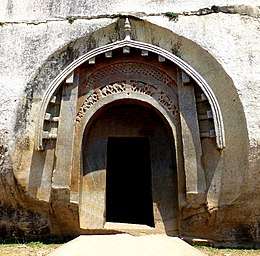Devavarman
Devavarman (or Devadharman) was a king of the Maurya Empire. He ruled in the period 202–195 BC. According to the Puranas, he was the successor of Shalishuka Maurya and reigned for a short period of seven years. He was not unrighteous, quarrelsome, very weak, and cruel like his predecessor, Shalishuka. But he was a bit weak, like all the Mauryan emperors who reigned after Ashoka. He was succeeded by Shatadhanvan.[1]
| Devavarman | |
|---|---|
| 7th Mauryan emperor | |
| Reign | c. 202 – c. 195 BC |
| Predecessor | Shalishuka |
| Successor | Shatadhanvan |
| Dynasty | Maurya |
| Religion | Buddhism |
| Maurya Empire (322–180 BCE) | ||||||||||||||||||||
|---|---|---|---|---|---|---|---|---|---|---|---|---|---|---|---|---|---|---|---|---|
|
||||||||||||||||||||
Notes
- Thapar, Romila (1998). Aśoka and the decline of the Mauryas (2nd ed.). Delhi: Oxford University Press. pp. 182–183. ISBN 0-19-564445-X.
Devavarman Maurya Dynasty | ||
| Preceded by Shalishuka |
Maurya Emperor 202–195 BC |
Succeeded by Shatadhanvan |
gollark: Which famous rant?
gollark: Minimum viable product? I don't think so. It has a 1.something version number and is being suggested all over the place for new software.
gollark: Really? Because it still seems to have most of the same problems.
gollark: The dependency management used to be atrociously awful, but has now moved to... possibly okay, I haven't researched go dep or whatever much.
gollark: Like I said, weird inconsistency everywhere, no generics, awful error handling.
This article is issued from Wikipedia. The text is licensed under Creative Commons - Attribution - Sharealike. Additional terms may apply for the media files.

